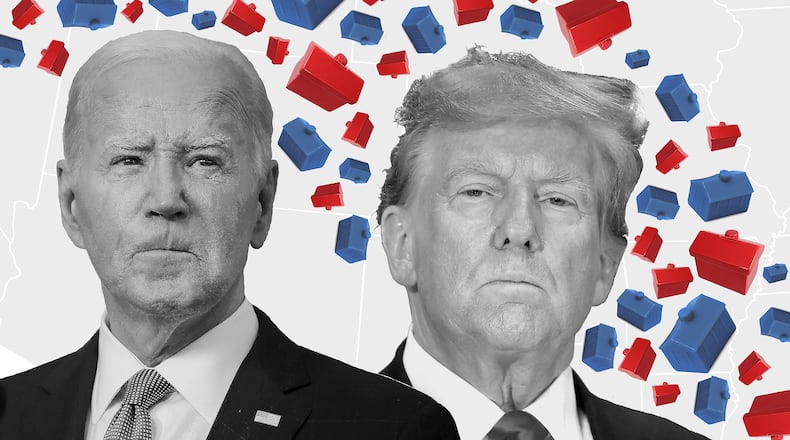Law student Aundria Towns and her partner, health care worker Hayden Herrick, have a household income of more than $100,000. Pre-pandemic, those earnings might have given the Douglas County couple a pick of houses.
Not in 2024.
Weighed down by student loans, $2,000-a-month rent, stubbornly high interest rates and soaring house prices, the couple has put their plans to buy a house in Cobb County on hold. At least for the time being.
“It seems so out of reach. It seems almost impossible,” Towns told The Atlanta Journal-Constitution.
That is a sentiment shared by millions of Americans struggling to get into starter homes, make rent, or upscale or downsize as the country prepares for the 2024 general election. Although concerns about inflation, food and gas prices are top of voters’ minds, housing is another pain point contributing to unease about the economy.
According to the national real estate brokerage company Redfin, about 53% of homeowners and renters said in February that the cost of housing will impact their pick for president. The AJC will be releasing a new poll next week that includes questions about the economy.
“For so many Americans, the rest of the economy is doing well,” Redfin’s chief economist Daryl Fairweather said. “But people still feel like they aren’t economically successful. They can’t own a home, and homeownership is more unaffordable than it’s ever been.”
The issue has been noticed in the White House, where President Joe Biden has made housing a priority as he eyes a second term and prepares to go head-to-head in a debate this Thursday with former president Donald Trump in Atlanta.
Meanwhile, Trump has said he would tackle the housing shortage by cutting energy costs and interest rates to fuel the construction of new homes. Recently, his campaign has blamed illegal immigration for contributing to the high cost of housing, claiming people living in the country without permission are making the housing shortage worse.
Regardless of Trump’s position, the poor perception of the economy and the high cost of housing could imperil incumbents. But Biden’s message on housing affordability, which includes building more homes and providing relief to first-time buyers and renters, is likely to resonate with those running in down-ballot races in the battleground state of Georgia, according to Jonesboro Democrat and State Senator Gail Davenport.
Davenport is running unopposed this year in a redrawn district that includes parts of Clayton and Henry counties. But she says she often gets calls from voters shaken by rising home and rent prices.
“A lot of people don’t want to say it but it’s a housing crisis,” she said. “Everything out there is $300,000 or $350,000. A lot of people see that as not being affordable.”
Credit: HYOSUB SHIN / AJC
Credit: HYOSUB SHIN / AJC
‘We’re stuck’
After years of inertia, conservative lawmakers have joined liberals at the national, state and local levels in recognizing there is a housing affordability crisis and are doing something about it. And for the first time in decades, housing could be a major issue during a presidential campaign.
In Georgia, housing advocates have often lamented the slow progress made on safe and affordable housing. But this year, Gov. Brian Kemp signed into law the Safe at Home Act, which provides modest protections for people renting neglected homes. The legislature preserved the state’s low income housing tax credit after lawmakers proposed a bill, House Bill 1182, to cut it. The credit is currently the only state funding to create or preserve affordable housing for low-income Georgians, according to advocates. After the passage of the Safe at Home Act, they now have sights on repealing Georgia’s ban on rent control.
Nationally, Biden has narrowed his focus on housing policy during his State of the Union address in March. His budget for the fiscal year 2025 proposes investing $258 billion to build or preserve two million more homes — though some studies suggest that is not nearly enough to close the gap.
He proposed a $10,000 tax credit to help middle-income homebuyers trying to get into their first home and for people who sell their starter homes, and $25,000 in down payment assistance.
But Atlanta realtor Maura Neill said it is beyond the scope of national politicians to make housing more affordable in Atlanta and Georgia. She said she would have more faith that someone running for city council, the county commission or state legislature could tackle a problem which includes local zoning and permitting hurdles.
“I would be really wary of someone who’s running for national office who promises me that they’re going to fix housing affordability because they’re not here in Atlanta or in Alpharetta, or here in Roswell with boots on the ground” she said.
Nevertheless, housing is an issue among the voters Biden will need to win over if he wants to take the battleground state, including Democratic-heavy Clayton County.
Voting right activists told the AJC in May that votes shouldn’t be taken for granted in the county and that housing is a burning issue. They suggested that U.S. senators in the state might have heeded the warning. In May, U.S. Sens. Raphael Warnock and Jon Ossoff committed $500,000 in federal funding for a Habitat for Humanity development called Hannah Springs in Lovejoy. The same month, the senators jointly announced $80 million in investments in housing authorities across the state.
Though it still pales in comparison to cities like New York and Los Angeles, the median home list price in metro Atlanta rose 30% between May 2019 and May 2024, according to Zillow data, and the supply of new housing is not meeting demand, particularly in the metro area, where population growth has outpaced construction.
According to real-estate marketplace company Zillow, the average home price in Atlanta in May was almost $400,000. People buying a home in the U.S. need to make about $114,000 a year to buy the typical house, according to a March report by Redfin. That is 35% more than the median household income of $84,000.
Biden knows he must convince Black voters to win nationally and in Georgia, and the housing crisis may have hit that constituency hardest. Although metro Atlanta has the highest rate of Black home ownership among the most populous cities in the US, the home ownership rate is 25 percentage points lower than the white home ownership rate. The gap is almost 30 percentage points in Cobb and Gwinnett and almost 25 percentage points in Clayton, according to the Atlanta Regional Commission.
Median rents in Atlanta are hovering around $2,100 a month. Earlier this year, the Harvard Joint Center for Housing Studies published a rental housing report suggesting that almost half of all renters are cost-burdened; meaning more than 30% of their income goes towards rent and utilities.
Sigrid Pearson lives in a two-bedroom apartment in Atlanta and pays $1,200 a month. Working two jobs as a cleaner and cashier, she earns less than $20 an hour, spending about half of her income on rent.
“I can barely afford $1,200,” she told the AJC earlier this year. “I’m going to have to downsize because it’s getting too expensive. They raise the rent every year.”
Jim Parrott, Barack Obama’s policy advisor and a non-resident fellow at the Urban Institute’s Housing Financing Policy Center, said he expects housing to be a running theme of the 2024 campaign. He said the issue could impact state and local races in Georgia, especially if Biden’s campaign surrogates adopt housing as a talking point.
“We’re stuck. They [voters] can see that in two, three months, gas prices may be down, the price of milk may be down but they can see housing is not going to be down,” he said.
The challenges in Georgia for both renters and homebuyers are worsened by Wall Street investment in housing, according to some housing experts. Since the Great Recession of 2008, Greater Atlanta has become ground zero for institutional investment with corporations buying up thousands of single-family homes.
Towns said she is competing for homes in a market where inventory is already stretched thin.
“It’s not leaving a lot out there for people to have options,” she said.
Credit: arvin.temkar@ajc.com
Credit: arvin.temkar@ajc.com
Hurting incumbents
Parrott said it’s difficult to predict how much Trump will make housing a campaign issue. But the former landlord and real estate’s mogul’s first term in office offers some hints on how he could approach housing, if he is reelected.
His administration was hostile towards the U.S. Department of Housing and Urban Development, installing Ben Carson, who had no experience in housing, to head the agency. Trump proposed painful cuts to federal affordable housing programs for low-income people and wanted to slash housing benefits. Each time, Congress rejected the proposals, according to the American Bar Association.
Trump discriminated against tenants when he was a landlord, added Porshalain White, Georgia state director for the Biden campaign.
“While Trump’s housing agenda would cut opportunities for home ownership for Black Georgians and make housing more expensive, President Biden and Vice President Harris have made tackling corporate greed and lowering costs a priority, and have proposed the boldest plan in a generation to lower housing costs and boost the housing supply,” White said in a statement.
Campaign spokeswoman Karoline Leavitt said Trump planned to fight illegal immigration, which she said was taking up available homes and driving up housing costs, and free up federal land for new construction. Campaign officials did not back up the claim on immigration and housing with research but said that it was “commonsense” that the millions of people without documentation are a factor in the increased demand for housing.
“On top of sky-high prices for rent, gas, and groceries, Bidenomics has made the American Dream of homeownership unreachable for young Americans and families across the country,” Leavitt wrote in an emailed statement.
It remains to be seen whether Biden’s proposals will be enough to persuade voters otherwise. Fairweather, of Redfin, said that one of the reasons people might have soured on the president could be rooted in housing.
“I think Biden is trying to change that sentiment by putting out policy and trying to paint himself as the person who’s going to solve the problem,” Fairweather said.
Judd Cramer is co-author of a National Bureau of Economic Research paper that attempted to unravel the mystery of why consumer sentiment about the economy was so negative with unemployment low and inflation falling.
The paper, published in February, suggested it could be explained, at least in part, by high borrowing costs.
“Home prices are up almost 50 percent since the start of the pandemic, while the 30-year mortgage rate has tripled since the historic lows of 2021,” the paper states. “Given that home prices remain at historic highs despite higher interest rates, the interest payment on a new 30-year mortgage for the average house has increased more than threefold since 2021.”
Cramer said voters in Atlanta and Georgia, just like voters in every other part of the country, know how difficult it is to buy a home right now. Not that long ago, rates were 3%. Now, they’re more than 7%.
“Nobody thinks it’s a good time to buy a home and I think that’s something that will certainly be hurting incumbents,” Cramer said.
Davenport agrees housing affordability is an issue that runs deep.
“No matter where you live or where your district lands, people in Georgia want a good quality of life. That trickles down to healthcare, education, jobs, the economy, and also housing,” she said.
For voters like Towns, the issue goes far beyond national politics. She said she would like to see more local officials advocating for affordable housing. When asked about who she would vote for, Towns demurred. But housing affordability will still be on her mind come November.
“I wish all parties would come together and see that there is a housing crisis,” Towns said. “I don’t know exactly who I’m going to vote for. I do know that it is a topic of discussion in our home.”
About the Author
Keep Reading
The Latest
Featured



